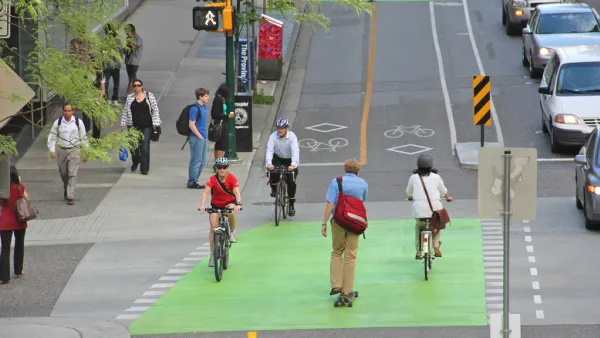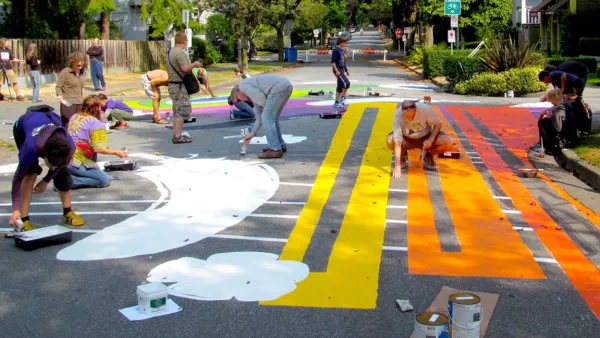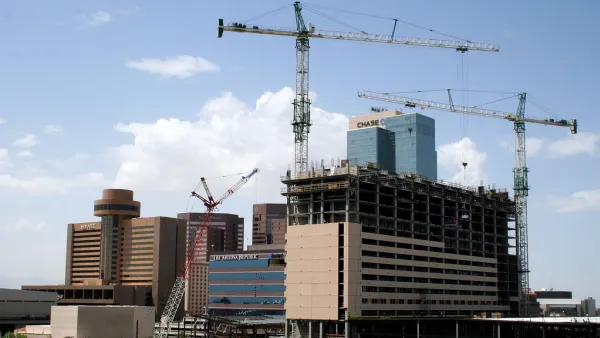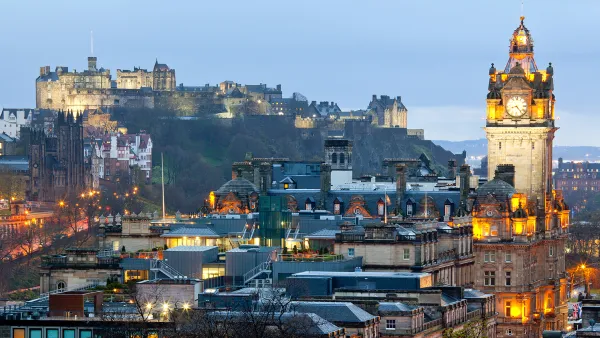Community / Economic Development

Economically Successful Cities Favor Space-Efficient Modes
Cities are, by definition, places where many people and activities locate close together. Their economic success and livability benefits from policies that favor space-efficient modes (walking, cycling, ridesharing and public transit).
Does Downtown San Diego Measure Up as a 'Vibrant Downtown'?
Piggybacking on John Karras's article, "12 Strategies That Will Transform Your City’s Downtown" (posted in Planetizen as "12 Strategies for Revitalizing Downtowns" on 2/26/1014), Bill Adams takes a look at how downtown San Diego measures up.
Pennsylvania’s Neighborhood Improvement Zones Paying Dividends
With 600,000 square feet of office and retail under construction in the center of Allentown, Pennsylvania, the state’s Neighborhood Improvement Zone program, launched in 2009, has had a substantial impact.
The Dichotomy of California's Frontier Myth: 'Hell-A' and Utopian San Francisco
“[There] is something about the frequency with which California and 'the future' are used synonymously,’ writes Kristin Miller. But the future looks much different when set in Southern California as compared to Northern California.
Urban Planning Fundamental: Facilitate a Strong Labor Market
Wendell Cox reviews a new working paper by Alain Bertaud called “Cities as Labor Markets.” Cox calls the lesson contained therein “Urban Planning 101” and a “much needed midcourse correction to urban planning around the world.”
Flint, Michigan, Declares ‘War on Blight’
Flint Mayor Dayne Walling used the occasion of his recent State of the City speech to call for a $70 million “war on blight” that would include the demolition of 6,000 buildings.
Denver Launching New Public Art Program
The Imagine 2020 program calls for partnerships between public agencies and the private sector—not to mention residents—in delivering new public art around the city of Denver.

10 Lessons in More Engaging Citizen Engagement
With cities seeking to involve diverse voices in city-making to get beyond “the usual suspects,” Vancouver urbanists Brent Toderian and Jillian Glover examine how cities in their region are finding new ways to increase civic participation.

How to Fund City Growth? Value Capture
Governments should look to land value tax to fund large city-building projects.
Portland Reconsidering its Urban Renewal Districts
The city of Portland is mulling changes to its urban renewal districts—including eliminating the newest of the lot, the Education District near Portland State University.

Why Urban History Matters
Chuck Wolfe's recent reconnaissance of Edinburgh provides a foil for his rallying cry: Going forward, let’s not discount the influence of history’s recurring themes in how we redevelop the urban realm.
Density: Difficulties Delivering on Campaign Promises in Minneapolis
The editorial board of the Minneapolis Star Tribune calls out the Minneapolis City Council following a recent decision to protect a one-story building at the cost of a hotel development plan.
Let Love Rule: Resilience in Mesquite
Are your local planning tools supporting a thriving and resilient future? Andrew von Maur shares a little inspiration from Las Cruces, New Mexico.
Atlanta’s Food Desert Problem
An estimated 500,000 residents of the Atlanta area live without access to grocery stores. A recent article asks the obvious question: “Why can we build multimillion-dollar highway systems and multibillion-dollar stadiums but not more grocery stores?"
A Guide to Organizations for Change—San Francisco Edition
The conversation about San Francisco has been dominated recently by housing, so maybe you forgot that San Francisco has a tradition of leading on social causes. Josh Wilson recently created a list for navigating the city like a radical.
Guerrilla Traffic Calming Efforts Elicit Mixed Responses
A recent article surveys a few examples of residents in cities around the country employing tactical urbanism. As tactical urbanism has been adopted in different ways in different cities, so to have the reactions of city leaders varied.
Debunking the One-Size-Fits-All Gentrification Model
Not all gentrification is alike. New research show just how different gentrification is in St. Louis as compared to Seattle or San Francisco.
Lessons for Detroit—from New Orleans
Detroit recently replaced New Orleans as the American city with the highest rate of blight. As Detroit undertakes its plans to shrink, which includes a massive blight removal campaign, what lessons from New Orleans bear repeating?
New Urban Math
To forge a coalition for urban places, let’s start by trumpeting an important fact: The value of cities and towns transcends simple arithmetic.
Philadelphia’s Middle Class—Down But Not Out
A new report by the Pew Charitable Trusts tracks the demographics of Philadelphia between 1970 and 2010. Overall, middle class residents left the city during those decades, but there are reasons for optimism regarding the prosperity of the city.
Pagination
Urban Design for Planners 1: Software Tools
This six-course series explores essential urban design concepts using open source software and equips planners with the tools they need to participate fully in the urban design process.
Planning for Universal Design
Learn the tools for implementing Universal Design in planning regulations.
EMC Planning Group, Inc.
Planetizen
Planetizen
Mpact (formerly Rail~Volution)
Great Falls Development Authority, Inc.
HUDs Office of Policy Development and Research
NYU Wagner Graduate School of Public Service


































